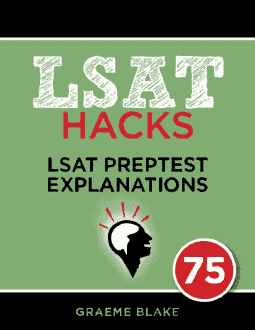QUESTION TEXT: Commentator: The Duke of Acredia argued long ago that…
QUESTION TYPE: Flawed Reasoning
CONCLUSION: The governments of Acredia need to care about the people to be successful.
REASONING: Every time the government has fallen, it’s been true that the rulers have disregarded the people’s needs.
ANALYSIS: This argument only shows a correlation. We don’t know if the lack of care towards the people caused governments to fall.
Heck, maybe every government of Acredia failed to care for the people’s needs, even successful governments. Some other factor like war or natural disaster could be the actual cause of government failure.
___________
- So? The commentator didn’t say that governments need to do exactly the same things for the people at all times. It only matters whether governments care.
- This isn’t a flaw! This answer says that absence of a condition “led” to failure. That shows the absence actually caused the failure. Therefore the inference is reasonable.
In the argument the commentator failed to establish that lack of care for the people actually caused failure. - This would be a flaw. But we have no reason to expect the Duke of Acredia was biased or unreliable. We know nothing about the Duke.
Also, the Duke was only mentioned to add color to the argument. The real evidence is the past history of government failure in Acredia. There was no bias there. - CORRECT. This is the real problem. The author has only shown that lack of care for the people is correlated with failure. They’ve never shown that lack of care actually caused failure.
- The commentator isn’t making an argument about virtue. The Duke said virtue is necessary, but the commentator’s argument is only about caring for the people’s welfare. (Which could be self-interested, not virtuous.)
So whether we can assess past virtue isn’t relevant to the commentator’s argument.


Can someone explain in greater detail the difference between B and D? I am reading them as saying basically the same thing..
Thanks!
(B) isn’t a flaw in reasoning because it’s actually showing causation. The absence of something always leads to failure. This answer choice is suggesting one thing actually caused another, which is not at all what the stimulus says. The stimulus just says that the fall of the government happened to occur at a time when an individual who didn’t care about the needs of the people was the ruler of Acredia.
(D), on the other hand, actually describes the logical flaw that shows up in the stimulus. The evidence presented in the stimulus only shows an association between two events, but you cannot conclude causation from an association.
I’m so confused by this.
I feel like B is showing that the argument is trying to show causation when it’s actually just a correlation, which is the flaw?
I still don’t see any difference between B and D.
Here is my thought process on B:
“Infers the necessity of a certain condition for success” So the argument is inferring that concern for the welfare of the people is necessary for successful governance, which is the conclusion of the argument.
“from the fact that its absence has always led to failure”
This is what the argument says when it says that, ‘when governments have fallen, their fall has always been during the rule of someone who disregards their needs”
I must be missing something here…
Another way to look at why D is the correct answer is to diagram this question. The commentator’s first sentence and conclusion can be expressed in a conditional relationship like this:
If Government Succeed –> Concern with Wellbeing
But in the second premise (“when Acredian governments have fallen, their falls have been during the rule of one who disregards the people’s needs”), he makes an error in his conditional logic. It becomes:
If ~Government Succeed –> ~Concern with Wellbeing
So if B were to be correct and is “inferring necessity of a certain condition from the fact that its absence has always led to failure”, then the conditional relationship would actually be the first sentence’s contrapositive:
If ~Concern with Wellbeing –> ~Government succeed
So from this, you can eliminate B. D works perfectly because it describes how the commentator witnessed two things happen together, and just assumed that one caused the other.